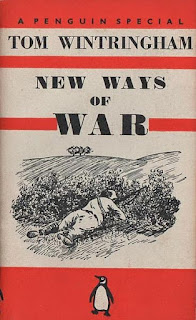In the book, Wintringham was withering in his denunciation of military blimps.
...
Wintringham wrote several pamphlets on the war effort including New Ways of War (1940), Freedom is Our Weapon (1941) and Politics of Victory (1941).In New Ways of War he wrote: "Knowing that science and the riches of the earth make possible an abundance of material things for all, and trusting our fellows and ourselves to achieve that abundance after we have won, we are willing to throw everything we now possess into the common lot, to win this fight. We will allow no personal considerations of rights, privileges, property, income, family or friendship to stand in our way. Whatever the future may hold we will continue our war for liberty."
https://www.military-history.org/books/new-ways-of-war-by-tom-wintringham.htm .
https://www.marxists.org/archive/hansen/1940/12/war.htm .
Hindenberg/Siegfried Line WW1 ..
In February 1937 he was wounded in the Battle of Jarama. While injured in Spain he became friends with Ernest Hemingway, who based one of his characters upon him. He spent some months as a machine gun instructor. When he returned to the battalion the next summer he contracted typhoid, was again wounded at Quinto in August 1937 and was repatriated in October. His later book English Captain is based on these experiences.
In 1938, the Communist Party condemned Kitty Bowler as a Trotskyist spy but he refused to leave her: he quit the party instead. He came to mistrust the party's subservience to Joseph Stalin's Soviet Union and Comintern. Back in England, Tom Hopkinson recruited him to work for the magazine Picture Post.
At the outbreak of the Second World War, Wintringham applied for an army officer's commission but was rejected. When the Communist Party promulgated its policy of staying out of the war due to the Molotov–Ribbentrop Pact, he strongly condemned their policies. Because of the appeasement policies of prime minister Neville Chamberlain, he also regarded the Tories as Nazi sympathizers and wrote that they should be removed from office. He wrote for Picture Post, the Daily Mirror, and wrote columns for Tribune and the New Statesman.
In May 1940, after the escape from Dunkirk, Wintringham began to write in support of the Local Defence Volunteers, the forerunner of the Home Guard. On 10 July, he opened the private Home Guard training school at Osterley Park, London.
Wintringham's training methods were mainly based on his experience in Spain. He even had veterans who had fought alongside him in Spain who trained volunteers in anti-tank warfare and demolitions. He also taught street fighting and guerrilla warfare. He wrote many articles in Picture Post and the Daily Mirror propagating his views about the Home Guard with the motto "a people's war for a people's peace".
The British Army still did not dare trust Wintringham because of his communist past. After September 1940, the army began to take charge of the Home Guard training in Osterley and Wintringham and his comrades were gradually sidelined. Wintringham resigned in April 1941. Ironically, despite his activities in support of the Home Guard, Wintringham was never allowed to join the organisation itself because of a policy barring membership to Communists and Fascists.
In 1942, Wintringham proceeded to found a Common Wealth Party with Vernon Bartlett, Sir Richard Acland and J. B. Priestley. He received 48 percent of the vote at the Midlothian and Peebles Northern by-election in February 1943, previously a safe Tory seat. In the 1945 general election he stood in the Aldershot constituency, the Labour Party candidate standing down to give him a clear race against the incumbent Conservative MP. His wife Kitty stood in the same Midlothian constituency that he had come so close to winning two years earlier, but neither was elected. After the war Wintringham and many of the founders of Common Wealth left and joined the Labour Party, suggesting the dissolving of CW.
Tom Wintringham died on 16 August 1949, aged 51, after a massive heart attack while he was staying with his sister at her farm at Owmby, Lincolnshire.
Books by Tom Wintringham:
- War! And the way to fight against it., Communist Party of Great Britain, London, 1932
- Air Raid Warning! Why the Royal Air Force is to be doubled, Workers' Bookshop, London, 1934
- The Coming World War., Wishart 1935
- Mutiny. Mutinies from Spartacus to Invergordon., Stanley Nott, London 1936
- English Captain., Faber 1939 (also in Penguin)
- How to reform the army ('Fact No. 98'), London, 1939
- Wintringham, Tom (1940). Deadlock War. Faber and Faber. ASIN B000OEKCHS.
- New Ways of War., Penguin Special 1940
- Armies of Freemen., Routledge 1940
- Ferdinand Otto Miksche: Blitzkrieg, translated by Tom Wintringham, Faber, London, 1941
- Peoples' War., Penguin Special 1942
- Freedom is our Weapon. A Policy for Army Reform., Kegan Paul 1941
- Politics of Victory., Routledge 1941
- Weapons and Tactics from Troy to Stalingrad., Houghton Mifflin, Boston, USA 1943, republished 1973 with Col. John Blashford-Snell ISBN 0-14-021522-0
- Your M.P. By 'Gracchus'. Gollancz 1944



No comments:
Post a Comment
Note: Only a member of this blog may post a comment.